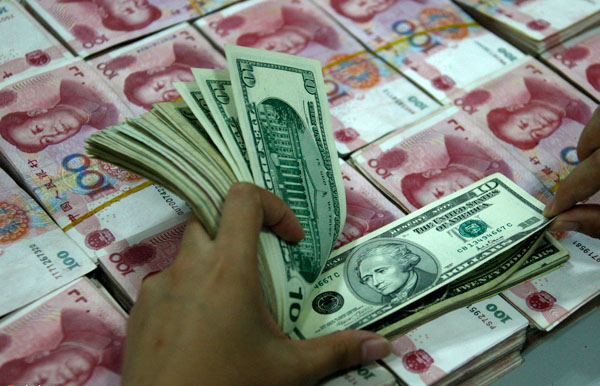Media Report

- The Financial Times comments: "Trade and currency issues have dominated the Trump administration's economic agenda with China. The 100-day plan agreed at Mar-a-Lago between Donald Trump and Xi Jinping will focus on moderating the bilateral trade imbalance...However, the more important economic concern has to do with Beijing's restrictive foreign investment regime, which has a negative impact on both the US and the EU...The problem is illustrated by the OECD's ranking of China as having one of the most restrictive foreign investment regimes for services, especially in communications, telecoms, law, insurance and finance — precisely the areas of greatest interest to American companies. Bilateral investment treaties have been under negotiation for many years between Beijing and both the US and EU. But discussions with the EU have been disrupted by Brexit and the Trump administration is resistant to an agreement that would encourage American companies to invest more abroad. Yet, for many American and European businesses operating in or hoping to operate in China, liberalising China's FDI policies would create commercial opportunities that would generate more jobs at home. Thus, moving forward with a bilateral investment treaty should be high on the agenda for both the US and EU."
- Reuters reports: "As the United Nations Security Council decides whether to tighten the sanctions screws on North Korea, the country's increasingly isolated government could lose a lifeline provided by state-owned China National Petroleum Corp (CNPC). For decades, the Chinese oil giant has sent small cargoes of jet fuel, diesel and gasoline from two large refineries in the northeastern city of Dalian and other nearby plants across the Yellow Sea to North Korea's western port of Nampo, five sources familiar with the business told Reuters. Nampo serves North Korea's capital, Pyongyang. CNPC also controls the export of crude oil to North Korea, an aid program that began about 40 years ago. The sources said the crude is transported through an ageing pipeline that runs from the border town of Dandong to feed North Korea's single operational oil refinery, the Ponghwa Chemical factory in Sinuiju on the other side of the Yalu river, which splits the two nations...The five people outlined previously unreported details about CNPC's deals with Pyongyang and how it came to dominate that business, giving insight into the two countries' relationship and what's at stake as decades of close ties sour badly because of growing concerns about North Korea's missile programs and development of nuclear weapons."
- BBC reports: "One of China's best-known human rights lawyers has been given a three-year suspended jail term for subverting state power. Li Heping was sentenced in a closed-door trial, Chinese state media say. He has defended other prominent lawyers, including Chen Guangcheng and Gao Zhisheng, as well as practitioners of the banned Falun Gong movement. A representative of campaign group Amnesty International questioned the validity of the allegations against Li. The lawyer was detained in 2015 as part of a wider government crackdown on dissent under President Xi Jinping. His trial took place on Tuesday in the Tianjin City Number Two Intermediate People's Court and concerned state secrets, the court said on its Weibo social media account...The suspension means Li could be released imminently, although it is unclear whether he has been. His time spent in detention should also count towards his jail sentence. Amnesty International's China researcher, Patrick Poon, said that holding the trial in secret showed allegations against Li were 'groundless and weak'."
Calendar
- 2017-04-27 China welcomes U.S. saying it's open to talks on North Korea
- 2017-04-26 China Celebrates Launch Of 'Homemade' Aircraft Carrier
- 2017-04-25 Alibaba launches program to help 1 million U.S. businesses sell to China
- 2017-04-24 China’s Leader Urges Restraint on North Korea in Call With Trump
- 2017-04-23 Chinese jihadis' rise in Syria raises concerns at home
- 2017-04-21 Is China too tough a steel beast for Trump to tame?
- 2017-04-20 Philippines checks report of 'harassment' near China-controlled reef
- 2017-04-19 China's Xi restructures military, consolidates control
- 2017-04-18 Ivanka Trump awarded trademark approval in China, dines with Chinese president at Mar-a-Lago
- 2017-04-17 Pence Visits North Korea Border, `Heartened' by China Moves
News
- Al Jazeera China welcomes US 'path of dialogue' for North Korea
- Reuters How North Korea gets its oil from China: lifeline in question at U.N. meeting
- BBC China human rights lawyer Li Heping given suspended jail term
- Bloomberg China's Didi Raises Over $5.5 Billion in Record Tech Funding
- USA Today Six things Trump can do to squeeze North Korea --without sparking war
- The Washington Post China publishes addresses of corruption suspects abroad
- The New York Times Wealthy Chinese Scramble for Imperiled Commodity: U.S. 'Golden Visa'
- The Wall Street Journal China Approves Bristol-Myers Squibb's Dual-Drug Hepatitis C Treatment
- The Financial Times BP sells stake in Chinese company to Sinopec arm for $1.68bn
- The Washington Post Trump now says he would check with China before another call with Taiwan's president
- Bloomberg China's Financial Crackdown Boosts Lure of Borrowing Offshore
- The Guardian 'I know he is alive': wife of Taiwan activist seized by China pleads for release
- The New York Times Chinese Offer to Eat Denmark's Oyster Problem to Extinction
Commentary
- The Financial Times US invests too little, not too much in China
- Aljazeera Trump's North Korea dilemma - are sanctions the way to go?
- The Hill Top commander: Don't bet on China reining in North Korea
- Quartz Elon Musk made a stealth visit to China this week
- The Diplomat China, Russia, and the Long 'Unipolar Moment' Revisited
- The National Interest How the "China Dream" Can Make America Great Again
- Forbes The Real 'China Model' Is Not What You Think
